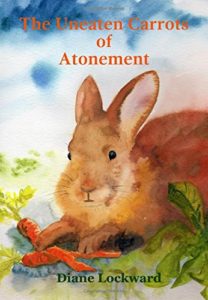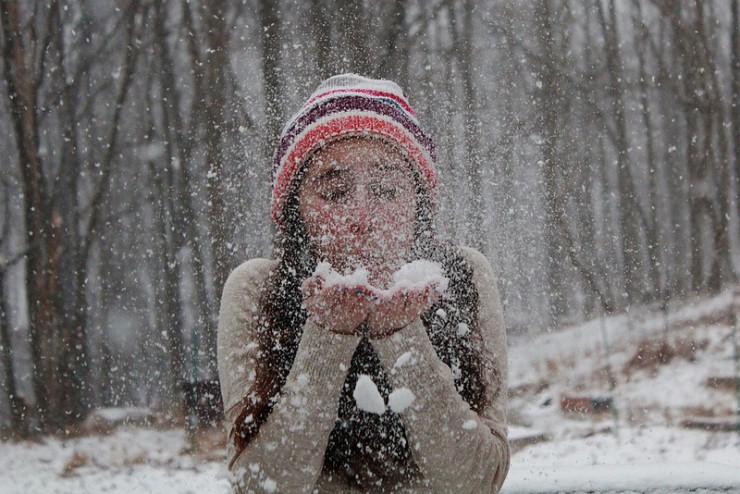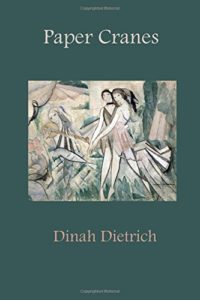We live in a world where relationships, so difficult to establish and understand, can often break. Relationships can fracture, but remain in place, such as with parents and even spouses, or they can disintegrate into separation—friends, lovers, colleagues, co-workers. Pressures and expectations can undermine even the best of relationships.
Two poets have published recent collections that explore these ideas about relationships. They approach their subjects from different perspectives, but both understand the real place and sense of shared responsibility of the individuals involved.
Dinah Dietrich’s Paper Cranes is a small collection of some 21 poems. Dietrich finds herself understanding and accepting her own sexual orientation as she quietly explores the relationships she has had with her individual parents and her grandmother. The grandmother comes off a bit better than the parents, but there is acceptance here, and judgment giving way to kindness.
I cup my hands together,
drink the cold water
that runs into my hands
from the tap on the sink
I stand in the hospital bathroom,
and drink,
imagining
the small stream of fresh water
that flowed once,
in the Adirondacks,
upstate New York
my mother taught me
how to cup my hands and drink,
imagining she could teach me
how stones can flavor water

Dinah Dietrich
In this poem, we don’t know who is in the hospital, or even what kind of hospital it is. But a hospital implies illness, and a few of the other poems suggest this is an illness involving a mother. You can read it one way—the poet is the hospital patient—or read it another—the poet is visiting someone in the hospital. The perspectives, as in many of Dietrich’s poems, conjure up very different images and understandings.
Dietrich writes poetry, memoir, and fiction. Her poems have been published in such literary magazines as The Berkshire Anthology and Sinister Wisdom and in the anthology A Slant of Light. She received her B.A. in literature from Bennington College and her M.A in Literature from the University of Massachusetts-Amherst. She lives in upstate New York.
Diane Lockward’s latest collection, The Uneaten Carrots of Atonement, includes 51 poems, many of them about relationships, and most of those failed. Collectively, these are poems about a hunger for something that works, something that is stable and enduring.
This poem is almost nostalgic and wistful in how it uses the metaphor of a plum pudding to describe something that two people believed was long-lasting but turned out to be more ephemeral.
We Were Such a Fine Plum Pudding

to read your spread palm,
the abbreviated lifeline and bad fortune,
as palm to palm we are no more,
nor plum to plum.
Such a fine pudding we made,
the long slow steam to perfection,
the struck match, the two of us drenched
in cognac, and served in a blaze.
And of! the very texture of us,
so dark we were almost black,
and dear God! so sinfully rich,
currants inside us plump and sweet,
and clotted cream like a moat around the base.
Yet the proof was in us—
at the heart, not a coin hidden, but a snake coiled.
The old story again—paradise at hand,
a man, a woman, a fruited tree,
only plum this time, perhaps for variety,
or so we thought—in truth, merely the illusion
of plums, our pudding misnamed and false,
overbaked and ruined—
my moist plum dried up, your poor plum
shriveled, a plumless pudding after all.

Diane Lockward
We know from the opening lines of the poem that this is about a failed relationship, but the second stanza is so strong and so vivid in its imagery that it suggests a regret at what was once shared but is now lost. And then the third stanza moves to the image of the Garden of Eden, the paradise lost because of “a snaked coiled.”
In addition to two chapbooks, Lockward has four previous collections of poetry: Eve’s Red Dress (2003); What Feeds Us (2006); Temptation by Water (2011); and Twelve for the Record (2012). She is also the author of The Crafty Poet: A Portable Workshop. Her poems have been published in a number of literary journals, including Harvard Review, Spoon River Poetry Review and Prairie Schooner.
Relationships are perhaps the oldest subject in poetry, but both Dietrich and Lockward show how the old and familiar can be made strikingly new again.
Photo by martinak15, Creative Commons, via Flickr. Post by Glynn Young, author of the novels Dancing Priest and A Light Shining, and Poetry at Work.
__________________________

“I require all our incoming poetry students—in the MFA I direct—to buy and read this book.”
—Jeanetta Calhoun Mish
- Longfellow’s “Paul Revere’s Ride”: Creating a National Legend - April 17, 2025
- Poets and Poems: Katie Kalisz and “Flu Season” - April 15, 2025
- Poets and Poems: Michelle Ortega and “When You Ask Me, Why Paris?” - April 10, 2025


Bethany says
Thanks for the post, Glynn. This line lingered with me for quite awhile: “how stones can flavor water”
Glynn says
Bethany – thanks for reading!
Dinah Dietrich says
So glad you liked my poem….the line, “how stones can flavor water”
So glad my mom taught me how to drink from my hands when no cup was available….
Bethany R. says
It’s a beautiful piece, so glad I got to read it.